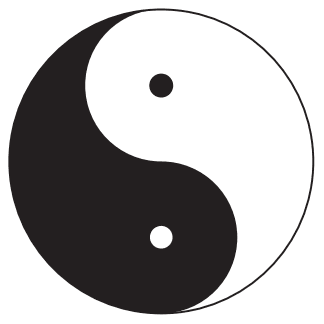We tend to divide Knowledge Management into opposing categories. Sometimes this is useful, but often this dualism is illusory.
 |
| Image from wikimedia commons |
Dualism is often a western mindset, and many eastern philosophies take a different view, where apparently opposite or contrary forces like Yin and Yang may actually be complementary, interconnected, and interdependent, and may give rise to each other as they interrelate (see picture!).
There has been a lot of dualism imposed on Knowledge Management - seeing things as alternatives rather than parts of a spectrum, or parts of a total system. For example, consider the following Knowledge Management questions, all of which I have heard asked:
- "Which is more important - Questions or Answers?"
- "Which strategy are you taking - Connecting or Collecting?"
- "Is KM best introduced Top-down, or Bottom up?"
- "Is KM all about People, or Process, or Technology, or Governance?"
- "Which should I focus on - Conversation, or Content?"
- "SHould I optimise my knowledge base for search or for browse?
All of these questions assume dualism, and only make sense if you assume dualism.
Now consider the following non-KM questions, and tell me if they make sense:
- "Which is more important - the positive terminal on a battery, or the negative?"
- "Which approach do you take when walking, using your right leg, or your left leg?"
- "Is it better to begin with breathing out, or breathing in?"
- "Which came first, the chicken or the egg?"
- "Is a coin all about the Heads, or the Tails?"
These second questions are ridiculous, and we know they are ridiculous because they try to apply dualism to something we know is a system - an electrical current, breathing, a coin, chicken-breeding and bipedal locomotion.
For me, the first set of questions are equally ridiculous. They also are applying a dualistic mindset to something that is a system.
- Questions and Answers are both equally important (or equally unimportant) in Knowledge Management. They are Demand and Supply, and both are needed for the flow of Knowledge. One without the other is pointless.
- You should be developing a Connecting AND Collecting strategy. These are not alternatives.
- KM is best introduced Top-down AND Bottom-up. Both the Top and the Bottom are stakeholders and both need to be involved.
- KM is all about People, and it is all about Process, and it is all about Technology, and it is all about Governance. These are the 4 legs on the KM Table.
- You should focus on Conversation AND Content. Content is something to talk about, Conversation is where Content is born and where it is Tested.
- You should optimise for search and for browse.




No comments:
Post a Comment